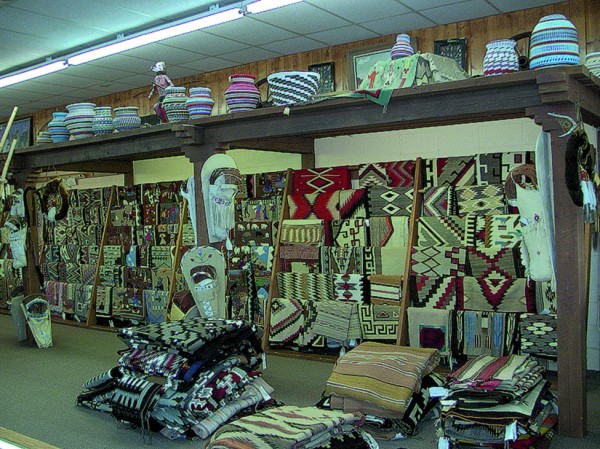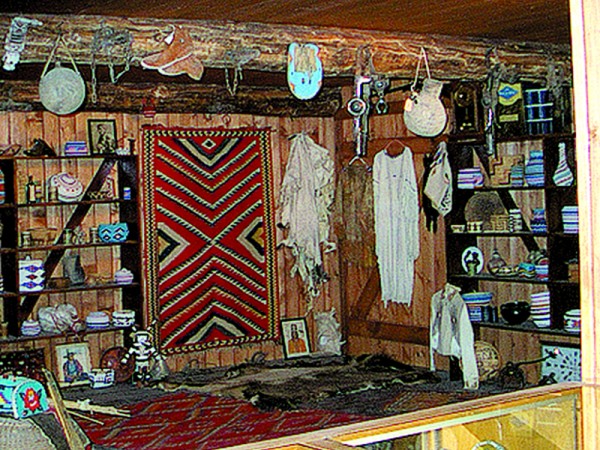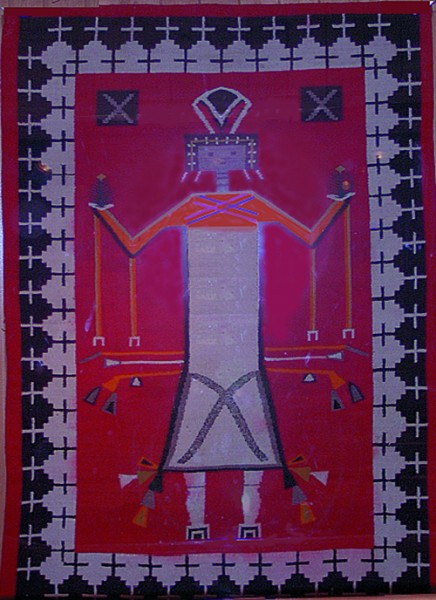Notah Dineh: Glenn and Gregg Leighton
Story, photographs, Kathryn R. Burke
Cortez, Colorado
 They moved into their present location on the corner of Main and Maple in 1993, but the Leighton family trading dynasty began four generations earlier with Jack Martin, great-grandfather to Notah Dineh’s present owners. “It’s our eighth year at this location, and our 40th in Cortez,” says Glenn Leighton, who together with his brother Gregg, owns Notah Dineh, the trading business started by their father, Bob Leighton.
They moved into their present location on the corner of Main and Maple in 1993, but the Leighton family trading dynasty began four generations earlier with Jack Martin, great-grandfather to Notah Dineh’s present owners. “It’s our eighth year at this location, and our 40th in Cortez,” says Glenn Leighton, who together with his brother Gregg, owns Notah Dineh, the trading business started by their father, Bob Leighton.
“It all started when Martin freighted onto the Navajo Reservation from Farmington back in the late 1800s. Eventually he and my granddad, became traders there. My dad started out in trading when he was 13 years old. The family was working at the Oljato Trading Post, near Monument Valley. Later Dad worked at Two Grey Hills, which my Uncle Willard owned. Uncle Willard married one of the Carson girls. The Carson’s were another trading family from the Farmington/Blanco area.”
After the Second World War, Bob Leighton went to school on the GI bill and became a teacher. But trading was in his blood. He opened Totah Trading in Farmington, and soon what had begun as a weekend job became a full time career. “We moved to Cortez in 1961,” Glenn says. “Dad’s first trading post here was just two and a half blocks north of this one and less than a quarter the size. We stayed there 32 years.”
Before the time Bob Leighton and his family moved to Cortez, his brother Willard died. Three years earlier he had started a Two Grey Hills weaver, Rachel, on the largest rug ever woven from that region. “Dad sold the rug for Two Grey Hills—for the first time—after Uncle Willard was gone. But he couldn’t afford to buy it or keep it. Money was tight. There were a lot of things Dad wanted to collect,” Glenn says, “but he couldn’t do it then.”
Thirty-two years later, however, he was able to buy the rug back. Perseverance had paid off. Hard-won prosperity finally prevailed. Bob Leighton and his sons moved into the new post equipped with a special below-street level museum to house much of Bob’s fascinating collection of Indian art and artifacts —and showcase that rug.
 As Glenn Leighton is relating the tale of his family’s history—including the fact that his paternal grandmother was born in a covered wagon—we are frequently, and politely interrupted by his customers. It is the third of the month, a busy day at this and the other Indian trading posts. Navajo, Ute and a few Hopi as well, come in to buy, sell, trade and pawn. Wearing their wealth, dressed in their fin(and other Native Americans) could not produce themselves,” Glenn explains. “They knew the families. They knew how many sheep they had, the good weavers. It’s not like this today, because of mobility and the wide-flung community. In the old days, the weavers had to walk or ride in to the posts—it was a great distance. Uncle Willard had hogans on the post so Indian weavers could stay over. Today’s posts are more of a glorified storage facility, a place to keep valuable things safe.”
As Glenn Leighton is relating the tale of his family’s history—including the fact that his paternal grandmother was born in a covered wagon—we are frequently, and politely interrupted by his customers. It is the third of the month, a busy day at this and the other Indian trading posts. Navajo, Ute and a few Hopi as well, come in to buy, sell, trade and pawn. Wearing their wealth, dressed in their fin(and other Native Americans) could not produce themselves,” Glenn explains. “They knew the families. They knew how many sheep they had, the good weavers. It’s not like this today, because of mobility and the wide-flung community. In the old days, the weavers had to walk or ride in to the posts—it was a great distance. Uncle Willard had hogans on the post so Indian weavers could stay over. Today’s posts are more of a glorified storage facility, a place to keep valuable things safe.”
Even so, like most long-term traders, the Leighton brothers and Notah Dineh see most items returned—less the interest payments for storing them. “Ninety-five percent of our pawn items are retrieved,” Glenn says. “In one to three months, they come in and take care of the interest or get the items out again. Often they bring them back again. As much for safe keeping as anything else.”
Whatever the reason for the transactions, outright purchase, short or long-term pawn “loans,” Notah Dineh respects their relationships with their clients. Courtesy is an important part of every transaction, and the mutual respect of trader and tradee is very evident. As is the quality of merchandise available in Notah Dineh.
 Besides the extensive weavings, the Leighton’s also carry a variety pottery, baskets, jewelry, kachinas, carvings and a number of other Indian arts and crafts as well as some supplies for making these items.
Besides the extensive weavings, the Leighton’s also carry a variety pottery, baskets, jewelry, kachinas, carvings and a number of other Indian arts and crafts as well as some supplies for making these items.
Notah Dineh, open Monday through Saturday, 9 a.m.-6:30 p.m. 345 W. Main, Cortez, CO. 1-800-444-2024.
